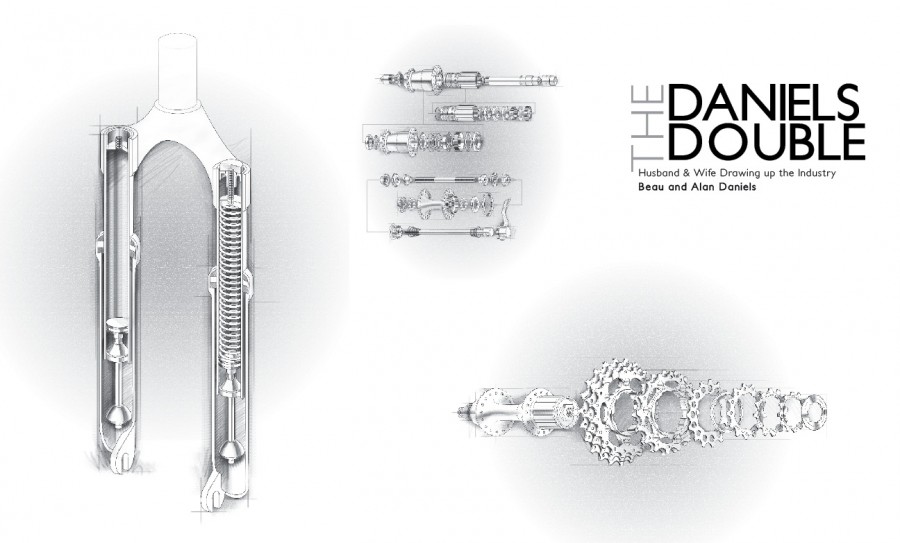
Taxonomy upgrade extras
The Daniels Double
A question and answer sort of bio.
- At what point did you guys become involved with drawing?
I have been drawing for as long as I can remember. Professionally, I started to make a living with the Young Artist agency in London, doing mostly science fiction illustration. They had tremendous publishing contacts, but no one would give me a break in England until I got the cover of Anarchistic colossus. An American publisher took a chance with me, and that helped with the English publishers. That brought a lot of work commercially but I was still able to pursue the fine art side. Beau was and is really a science major and businessperson. The passion for Beau is in chasing the job and managing the process. This works very well for us.
- What would you consider to be your first BIG GIG as an artist? That is to say, what piece or body of work got your foot in the door of Illustration? Who was involved? What happened after that?
Our big break was moving to Los Angeles to work on Blade Runner. There were a large number of illustrators brought over from the Young Artists agency to work on the film. They had a connection with Ridley Scott from his commercial filming. It was not an easy time working for the Ladd Company; all the other English artists eventually stopped and returned to England. We had already made the commitment to stay, but if we had the money in the first year we would have returned also. Working for the movie industry, you are at the mercy of too many egos. They had the ability to twist you around. But this was probably the best thing that happened to us work-wise. We made lots of contacts, built our credibility and figured out which field of illustration would suite both of our work habits.
- Did you guys have mentors? Who were they?
Neither of us have had mentors, but we have been lucky in meeting people who have helped our careers. One collector of my fine art work, when he found out out that we were moving to the USA, bought our entire collection of commercial artwork from us. It helped in the expense of moving. He ran Museum Gallery and was a coin merchant in London, as well as a bit of a philanthropist. A very good man, who we are still in contact with today.
- What did school do for you? (I know that sounds naive, but some artists say school did not give them much, others say a lot, what’s your take?). Any particular instructors, classes or groups that propelled you into doing illustration professionally?
School taught me self-discipline and motivation. Again, I was lucky at school. The teachers we had were David Hockney, Roland Piche, David Hall, Phillip Glass and Billy Apple. It was a very progressive college that believed in developing skills not only in your chosen field, but also survival skills for the work environment.
- Any regrets? If you could go back and do anything differently, what would you do?
None at all.
- How did you and your wife go about selling and marketing yourselves? How do you continue to do so?
Beau does the marketing. We have advertised in the workbook, Graphic Artist Guild Book, and Medical Artists Book for many years. This form of advertising is being fazed out as we get most of our work through our web sites. We have about twenty sites—the reason for so many web sites was to narrow them down in content so that they could be more specific, e.g. Cutaway-illustration.com. Essentially, that is a simple teaser site to get people to go to the beaudaniels.com site, but also a way of covering a lot more ground on the web.
- On a personal note…. what is the philosophy behind your craft and work?? Are there any deep reasons for what you do? Or is it just to pay the bills? What is your philosophy on the art world in general?
We always do the best work we can; even if, as sometimes happens, you have underestimated the complexity of the illustration. Sometimes that’s through your own fault, sometimes just misunderstanding, and sometimes the client not quite telling the truth at the onset. The latter reason is easier to rectify in that we will ask for a budget increase if we have not been given correct information up front. Once you have committed to a job, the money no longer matters. Trying to get something creative wise out of every job you do, that can be difficult! Attitude towards the illustration business is changing. We are finding more and more agency contracts to be unacceptable in their demands, copyright ownership, work for hire etc. We will not work under either of those conditions, and fight strongly for artists’ rights to their work. I will always draw whether or not I get paid for it, but what I draw, that would be different. Having been on both sides, working commercial illustration and trying to produce fine art, there is now so little difference. Fine art through the marketing process has attached itself to the commercial realm. I dislike it intensely when the fine art “world” criticizes us for being commercial illustrators. They really don’t like the fact that they can’t control you because the commercial work has given us financial freedom.